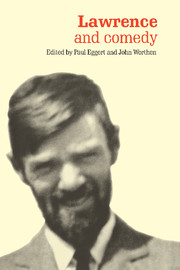Book contents
- Frontmatter
- Contents
- Note on contributors
- Acknowledgements
- Cue-titles
- Introduction
- 1 Drama and mimicry in Lawrence
- 2 Mischief or merriment, amazement and amusement – and malice: Women in Love
- 3 Comedy and hysteria in Aaron's Rod
- 4 D. H. Lawrence and his ‘gentle reader’: The furious comedy of Mr Noon
- 5 ‘Homunculus stirs’: Masculinity and the mock-heroic in Birds, Beasts and Flowers
- 6 Comedy and provisionality: Lawrence's address to his audience and material in his Australian novels
- 7 Lawrence's satiric style: Language and voice in St. Mawr
- 8 Humour in the letters of D. H. Lawrence
- 9 Lawrence to Larkin: A changed perspective
- Index
6 - Comedy and provisionality: Lawrence's address to his audience and material in his Australian novels
Published online by Cambridge University Press: 01 March 2010
- Frontmatter
- Contents
- Note on contributors
- Acknowledgements
- Cue-titles
- Introduction
- 1 Drama and mimicry in Lawrence
- 2 Mischief or merriment, amazement and amusement – and malice: Women in Love
- 3 Comedy and hysteria in Aaron's Rod
- 4 D. H. Lawrence and his ‘gentle reader’: The furious comedy of Mr Noon
- 5 ‘Homunculus stirs’: Masculinity and the mock-heroic in Birds, Beasts and Flowers
- 6 Comedy and provisionality: Lawrence's address to his audience and material in his Australian novels
- 7 Lawrence's satiric style: Language and voice in St. Mawr
- 8 Humour in the letters of D. H. Lawrence
- 9 Lawrence to Larkin: A changed perspective
- Index
Summary
Applying a new and at first sight unlikely focus to Lawrence's writings – the presence and workings of comedy in them – has, I believe, the power to help clear a now-historical log-jam in Lawrence criticism. His post-Second World War critics inevitably constructed their image of him according to the needs of their age, and those needs have changed: the seductions of the saviour-Lawrence or normative-Lawrence of the 1950s to 1970s are rapidly losing their allure. I am not offering in this essay to contextualise historically the rise and dissemination of this Lawrence: the priest of love, the anti-mechanisation vitalist, the morally intelligent prophet of Life, the exposer of the distorting effects involved in the tyranny of mind over body. Yet, it seems to me, a historiography of Lawrence criticism badly needs to be done. It would, I envisage, relate the normative-Lawrence to the increasing numbers of departments of English after 1945 (and especially in the 1960s); and it would examine the rise of New Criticism and Leavisism as their intellectual vehicles in a period when commitment to older forms of historicism (requiring large research libraries) was gradually falling away. The account would discuss that sense of post-war cultural crisis which the Lawrence of the period was, at some level I suspect, felt to be addressing: industrial and atomic age anxieties; the de-politicised cultural navel-gazing caused by the deadly melodrama of Cold War politics – or, putting the emphasis differently, the fear of a politicising style of literary criticism in a McCarthyite era.
- Type
- Chapter
- Information
- Lawrence and Comedy , pp. 131 - 157Publisher: Cambridge University PressPrint publication year: 1996



